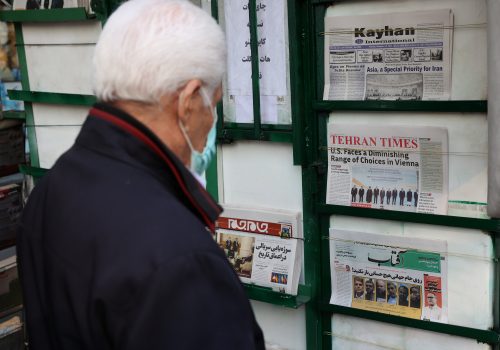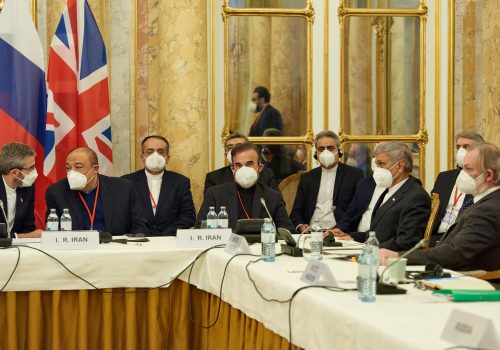Israel pumps up the volume on Iran
“Loose Lips Sink Ships”—the pithy slogan crafted by the War Advertising Council and deployed on US Office of War Information posters during World War II—cautioned Americans against engaging in reckless speech that could compromise the nation’s security. By that standard, the torrent of verbiage being unleashed from the mouths of former and current Israeli officials regarding the moribund 2015 Iran nuclear deal and its salvage prospects threatens to scuttle the entire navy.
The rhythm of Israel’s messaging on Iran suffers from a case of chronic schizophrenia. In the past, some Israeli principals were reluctant to lead the international chorus proclaiming the dangers of Tehran’s nuclear program. Their concern was that sympathetic countries might mistakenly perceive Iranian belligerence as an exclusively Israeli problem and wash their own hands of any responsibility for dealing with the matter. Other Israeli leaders have been loud and eager soloists, arguing that subtlety would signal the absence of any pending crisis—thereby allowing the global community, once again, to absolve itself of any obligation to join the fray. The latter cohort is firmly dominant today. Additional noise is generated by raging Israeli government debate over the most prudent approach to curtail Iran’s nuclear ambitions, with remarks made behind closed doors spilling chaotically into the public domain.
The commencement of multilateral talks in Vienna has brought all these voices to a fever pitch, with the negotiations on a possible return to the Joint Comprehensive Plan of Action (JCPOA) triggering a storm of undiplomatic pronouncements from Prime Minister Naftali Bennett and other senior Israeli officials. This opportunity to impact—or even torpedo—a future JCPOA 2.0 has also ignited a parallel conversation on former Prime Minister Benjamin Netanyahu’s performance vis-à-vis the original 2015 accord, which he actively resisted.
Iran is “carrying out ‘nuclear blackmail’ as a negotiation tactic,” Bennett told US Secretary of State Antony Blinken on December 2. “This must be met with an immediate cessation of negotiations and by concrete steps taken by the major powers,” the prime minister concluded, according to a readout of the call.
“Iran will not have nuclear weapons—not in the coming years, not ever. That is my promise,” Mossad chief David Barnea weighed in that same day.
“In the case of a failure to achieve a comprehensive, diplomatic solution, Israel is keeping all options on the table,” President Isaac Herzog announced two days later, upon receiving the credentials of new US Ambassador to Israel, Thomas Nides.
It is evident that a potent mix of policy, personality, and politics is driving this defiant discourse.
The JCPOA was never viewed—even by its signatories—as an ideal, loophole-free construct. Western critics pointed to the framework’s sunset clauses, which cleared the path to Iran’s unimpeded uranium enrichment in only fifteen years. Similarly unpalatable was the document’s intentional dodge of Iran’s development of ballistic missiles and support for terrorism, activities which could expect to be scaled after the promised removal of economic sanctions. In Israel, where these deficiencies were cause for particular consternation, decision-makers rejected the JCPOA uniformly, exhibiting little tolerance for those who maintained that its imperfect provisions were helpful nonetheless and better than prevailing alternatives.
This history provides the backdrop to the present-day cacophony of chatter emanating from members of Israel’s agitated political and defense establishments. Propositions, however unlikely, of either reinstating an obsolete bargain—whose contours are a gross mismatch for the current reality in which Iran’s nuclear project has already progressed well beyond prescribed limits—or replacing it with an even leaner interim, “less for less” arrangement are fueling reflexive, if not always synchronized, pushback from Israel. Aspirations of the Joe Biden administration aside, the chances of reaching a “longer and stronger” deal appear slim to none. The default scenario of a vacuum which Iran exploits to coast up to or even over the nuclear threshold—almost certainly inaugurating a Middle East nuclear arms race—has Israel thoroughly spooked.
Israeli strategists and talking heads are, thus, focused both in their ominous public comments and actions on the proverbial Plan B—a backup plan to thwart Iran’s nuclear objectives—which, by their reasoning, should be formulated and placed on immediate standby as a menacing stick to elicit Iranian flexibility in Vienna. In this context, the shrill warnings that Israel will, if left with no choice, operate independently to eliminate any Iranian threat to its security are intended not for Tehran’s consumption but rather for the US and its partners. They carry the dual message that the remaining signatories and the US should refuse to settle for anything other than an airtight deal—lest the Israel Air Force be pressed into service to tie up loose ends—and that they had best join Israel in designing a contingency option that credibly leverages their combined economic and martial capabilities, unless they would prefer that Israel act alone and leave them to cope with the fallout.
A second audience is domestic public opinion within Israel, where the fledgling Bennett government is bent on proving that it is no less competent than their predecessors when deterring Iran. Bennett himself hopes that his confident rhetoric—together with the allocation of hefty budgets for military procurement and training—will win him back some of the right-wing support that he has hemorrhaged since forming Israel’s current coalition. A recent Israel Democracy Institute poll found that more than half of Israelis would support the idea of a preemptive Israeli Defense Force strike on Iranian nuclear installations, an operation for which Israel has reportedly allocated $1.5 billion.
More broadly, the march back to the negotiating room opened the door to a grand reevaluation of Netanyahu’s tactics and record on Iran, with his defenders accusing Bennett of ineptitude—and vice versa. Team Netanyahu has broadcasted that Bennett’s efforts have been thoroughly ineffective at halting Iran’s surge towards nuclear weapons capability, and that the Bennett government has subcontracted the task to a White House that has no interest in Israel’s reservations (the irony that Bennett has taken to imitating some of Netanyahu’s game plan has not been lost on observers).
Prime Minister Bennett retorted in September that Netanyahu bequeathed him “a situation in which Iran is at the most advanced point ever in its race to the bomb” and that “the gap between [his] rhetoric and speeches and actions is very big.” Other Netanyahu skeptics have piled on, including many former officials who are now coming forth to clear their consciences. In early December, former Prime Minister Ehud Barak took to the pages of Israel’s Yediot Ahronot newspaper to denounce Netanyahu’s alienation of President Barack Obama and subsequent persuasion of President Trump to withdraw from the JCPOA in May 2018 as contributing factors to Israel’s dangerous predicament (Trump, in an interview with Axios’ Barak Ravid, accused Netanyahu of “using him” on Iran).
The latest indications are that Bennett may be recalibrating Israel’s posture. In light of assessments that Israeli influence over the Vienna process has maxed out and amid dismay that all the saber-rattling may have become a liability to Israel’s national—if not political—interests, an essential course correction seems to be underway with Bennett working concertedly to improve the atmosphere and content of Israel’s dialogue with Washington. The US, a conciliatory prime minister declared before Ambassador Nides on December 5, is “our biggest friend in the world.”
On the very next day, following conspicuously on the heels of a direct appeal by Secretary Blinken to Bennett, the Jerusalem District Planning Committee delayed approval for construction at the site of the shuttered Atarot airport indefinitely.
Defense Minister Benny Gantz and Barnea both visited the US capital last week for frank and substantive consultations with their American counterparts—away from the media spotlight—which reportedly considered a joint rehearsal of a potential, last resort assault on Iranian nuclear facilities.
These discussions are taking on even greater significance as the tenor of the talks with Iran turns bleak and their collapse becomes a genuine possibility. Standing at this precarious juncture, Israel will want to compel tighter message control as a critical complement to devising and enforcing coherent red lines that will spark forceful retaliation if Iran crosses them.
Shalom Lipner is a nonresident senior fellow for Middle East Programs at the Atlantic Council. From 1990 to 2016, he served seven consecutive premiers at the Prime Minister’s Office in Jerusalem. Follow him on Twitter @ShalomLipner.
Further reading
Tue, Dec 14, 2021
What happens if Iran nuclear talks collapse?
IranSource By Masoud Mostajabi
On December 9, the Atlantic Council’s Future of Iran Initiative (FOII) held a virtual public event on whether a ‘Plan B’ exists in the event the nuclear talks fail.
Mon, Dec 6, 2021
Iran offers less for more as Vienna talks stall
IranSource By Barbara Slavin
More than five months after multilateral nuclear talks with Iran were paused before the country’s presidential elections in June, a new negotiating team arrived in Vienna in late November with additional demands and fewer concessions than its predecessors.
Wed, Sep 1, 2021
An escalating Israel-Iran conflict could sink the JCPOA
IranSource By
Rising tensions between Israel and Iran have reached an alarming stage in recent weeks. What used to be a shadow war of covert operations, sabotage, and proxy conflict is turning into a more direct military confrontation between the long-time regional adversaries.
Image: Israeli Prime minister Naftali Bennett, Foreign Minister Yair Lapid and Defence Minister Benny Gantz sit together following the vote on the new coalition at the Knesset, Israel's parliament, in Jerusalem June 13, 2021. REUTERS/Ronen Zvulun


